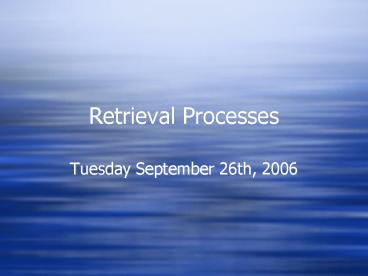Retrieval Processes PowerPoint PPT Presentation
1 / 22
Title: Retrieval Processes
1
Retrieval Processes
- Tuesday September 26th, 2006
2
Signal Detection Theory
- Signal Baseline Noise
- Evidence that item was previously seen
- Familiarity
- Hits/Misses/False Alarms/Correct Rejections
- Importance of errors guessing
3
Recognition Memory Test
Correct Answer Old New
Response
Old Hit FA New
Miss CR
FAFalse Alarm CRCorrect rejection
4
Distributions for Signal Detection
5
Processes Dissociation
- 2 processes?
- Recollection and Familiarity
- Mandler Butcher on the Bus
- Jacoby (1991)
- Automatic and intentional processes in
recognition memory
6
Evidence from amnesia
P L I _ _ _ _
ORANGE
Warrington Weiskrantz (1970)
7
Evidence from normals
A _ _ A _ _ I N C _ A R _ T _ H _ O _ R E M _ Y S
_ _ R Y
Tulving, Schacter Stark (1982)
8
False fame effect
- Study
- Read non-famous names aloud (e.g. Sebastian
Weisdorf) - Full attention
- Divided attention(digit detection)
- Test
- Fame judgements
- Old, non-famous (e.g. Sebastian Weisdorf)
- New, non-famous(e.g. Avril Zwickel)
- Famous(e.g. Christopher Wren)
Jacoby, Woloshyn, Kelley (1989)
9
Retrieval routes
- Intentional
- Effortful
- Automatic
- Familiarity-based
10
Naïve empiricism
- Intentional or explicit tests
- Recall, recognition
- Automatic or implicit tests
- Fragmented words, fragment completion, fame
judgements.
11
Process dissociation
- Intentional process
- Automatic process
- Typically, both contribute to successful
retrieval - Stronger claim Both contribute, but the
contributions are independent.
Jacoby (1991)
12
Process dissociation procedure
- Read a list of words List 1
- Hear a list of words List 2
- Two retrieval tests
- Both tests include List 1, List 2 and novel
words. - Inclusion test Respond old if word was on
either list. - Exclusion test Respond old only if word was on
List 2.
13
Inclusion test
- Inclusion test Respond old if word was on
either list. - Intentional (recollective) process will have a
certain probability of concluding old for List
1 words R - Automatic process will also have a certain
probability of concluding old for List 1 words
A - If either process concludes old, the subject
will respond old - P(old) R A RA (Laws of probability)
14
Exclusion test
- Exclusion test Respond old only if word was on
List 2. - Subject will only respond old to List 1 words
if two things happen - The automatic process responds old due to a
feeling of familiarity A - The intentional process fails to recognise the
word (if it had, it would recall it was from List
1) (1-R)
P(old ) A(1-R)
15
Dissociating the processes
- Inclusion P(old) R A RA
- Exclusion P(old) A(1-R)
- Inclusion Exclusion
- ( R A RA ) A (1 R)
- R A RA A RA
- R
- A Exclusion / (1-R)
16
Process dissociation Evidence
- Read a list of words List 1
- Hear a list of words List 2
- Two retrieval tests
- Inclusion test P(old) 0.48
- Exclusion test P(old) 0.37
- R Inclusion Exclusion 0.11
- A Exclusion / (1-R) 0.37 / 0.89 0.42
- Intentional process should be eliminated by
divided attention (digit task) R 0. - Exclusion A(1-R) 0.42 (1-0) 0.42
- Actual data 0.43
Jacoby (1991)
17
Interim summary
- R retrieval
- Retrieval is explicit
- Intentional
- Effortful
- Retrieval is conceptually-driven
- Retrieves episodic information
- Highly contextual
- Interference-prone (e.g. effect of delay).
18
Interim summary
- A retrieval
- Retrieval is implicit
- Relatively automatic
- Relatively effortless.
- Retrieval is data-driven
- Retrieval can be based of a feeling of
familiarity. - Retrieves semantic information
- Relatively non-contextual
- Relatively robust to interference (e.g. effect of
delay).
19
Ironic effects of repetition
- Can get younger adults to perform like older
adults by changing the duration of interval
20
(No Transcript)
21
Paula
- I think that one of the most important factors in
discriminating between intentional and
unintentional memory (or recollection and
facilitation) is to have subjects be unaware of
the memory test they will be given. Would it
work to have a two part experiment where the two
sections are almost completely separate? Perhaps
having subjects read a passage or two and have
them answer opinion questions on the piece or
have a passage with errors that they need to
correct and then in the second part of the task
maybe give them sentences or phrases and ask them
if they were in the passage or have them fill in
incomplete phrases from the passage. Could this
work as an effective "factor-pure" test?
22
Rob
- In Jacoby's Future Directions he discusses that,
"the process dissociation procedures might be
seen a way of 'correcting' for the influence of
episodic memory on a n indirect test of memory".
In assuming that there is a correction process
does that not imply an order of events with sort
of 'check point'. I think it would be interesting
to devise a study in which recollection
(intentional) and recognition (automatic) are
compared in both time and order. There have been
studies in which recognition memory was timed
using fMRI and ERP (Henson, 1999 Duzel 2001).á
However from what I can tell there have been no
studies directly comparing the timing of these
two uses of memory. An even more significant
study would be one that analyzed the order of
theses processes (if any).á This might suggest
one of these systems acting as an internal
'check' in order to improve accuracy.

